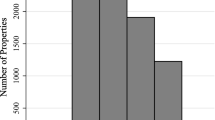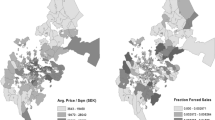Abstract
Using New Orleans foreclosure data, where each property has three appraisals (borrower, lender, and referee), we are able to investigate the factors affecting appraisal bias and accuracy for distressed properties. Unconditional analysis shows that on average lender appraisals are higher than referee appraisals, while borrower appraisals are lower than referee appraisals. Much of the bias could be explained by various client and appraiser characteristics. The relation between the client and the appraiser affects valuation bias. Customer employed appraisers tend to give more client friendly valuations than their court appointed counterparts. However, experienced and licensed appraisers render less biased valuations. The appraisal bias does not appear to depend on neighborhood and demographic characteristics. In addition, experienced and licensed appraisers provide materially more accurate valuations. Unlicensed, inexperienced appraisers have an error rate approximately four times worse than licensed, experienced appraisers.
Similar content being viewed by others
Notes
Since the law uses the term appraisal, but does not require state licensing, we will use the terms appraisal and valuation synonymously.
The data shows that on average the referee appraisal carries a higher value for lender customer employed properties than for lender court appointed properties. This may create a potential selection bias issue. However, we performed a Probit analysis of CE choice. The regression was insignificant. Therefore, we conclude that the potential selection bias does not pose a serious problem.
The referee valuation is thus “anchored” and this can increase error rates in some cases (Diaz and Hansz 2001). However, given the magnitude of biases in this setting, a referee may serve a very useful role.
References
Amidu, A., Aluko, B. T., & Hansz, J. A. (2008). Client feedback pressure and the role of estate surveyors and valuers. Journal of Property Research, 25, 89–106.
Chinloy, P., Cho, M., & Megbolugbe, F. I. (1997). Appraisals, transaction incentives, and smoothing. Journal of Real Estate Finance and Economics, 14, 89–111.
Diaz, J., & Hansz, J. A. (2001). The use of reference points in valuation judgment. Journal of Property Research, 18, 141–148.
Dotzour, G. M. (1988). The impact of professional designation on appraisal variation in corporate relocation appraisals. The Appraisal Journal, 56, 522–530.
Freddie Mac (2009). Home valuation code of conduct. March 31.
Graff, A. R., & Young, S. M. (1999). Magnitude of random appraisal error in commercial real estate valuation. Journal of Real Estate Research, 17, 33–54.
Housing and Urban Development (2009). Hud Secretary Donovan announces expanded eligibility for making home affordable refinancing. HUD News Release, July 1.
Lam, N., Pace, R. K., Campanella, R., LeSage, J. P., & Arenas, H. (2009). Business return in New Orleans: Decision making amid post-Katrina uncertainty. PLoS ONE, August.
LeSage, J. P., & Pace, R. K. (2009). Introduction to spatial econometrics. Boca Raton: CRC Press/Taylor & Francis.
Levitin, A. (2009). Resolving the foreclosure crisis: Modification of mortgages in bankruptcy. Wisconsin Law Review, 565. Available at: http://works.bepress.com/adam_levitin/12
Pennington-Cross, A. (2006). The value of foreclosed property. Journal of Real Estate Research, 28(2), 193–214.
U.S. Department of the Treasury (2009). Home affordable modification program guidelines. March 4.
Acknowledgements
The authors would like to thank Henry Munneke for his very helpful comments. We are grateful for the constructive comments from Dean Gatzlaff, William Goetzmann, Stacy Sirmans, Austin Jaffe, and other participants in the Florida State University Critical Issues in Real Estate Symposium. In addition, we would like to thank Clifford Stephens for his insightful comments. The authors would like to thank the National Science Foundation for their support of our research through the following grants SES-0554937 and SES-0729264. All errors are our own.
Author information
Authors and Affiliations
Corresponding author
Rights and permissions
About this article
Cite this article
Zhu, S., Pace, R.K. Distressed Properties: Valuation Bias and Accuracy. J Real Estate Finan Econ 44, 153–166 (2012). https://doi.org/10.1007/s11146-010-9290-z
Published:
Issue Date:
DOI: https://doi.org/10.1007/s11146-010-9290-z




